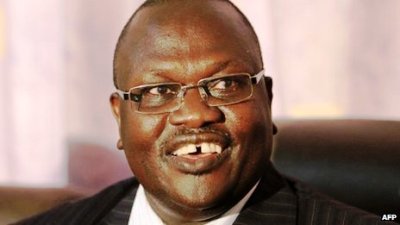South Sudan’s ex-VP, six others to face treason charges
January 28, 2014 (JUBA) – South Sudan government on Tuesday slapped treason charges against seven of its 13 senior politicians implicated in last year’s alleged coup attempt in the country’s capital, Juba.

The country’s justice minister, however, said rebel leader Machar, former Unity state governor Taban Deng Gai and ex-environment minister Alfred Lado Gore would have to be tried for treason in absentia. Others like Pagan Amum, Majak D’Agoot, Oyai Deng Ajak and Ezekiel Lol Gatkuoth would not be released, pending their trial.
“We believe the three principle people participated in the fight on the [December] 15th and on 16th [2013]”, Paulino Wanawilla told reporters in the capital, Juba.
“These people have a case to answer before the court for planning and carrying out the coup. Anybody who intends to change a constitutional government or to suspend the constitution or abrogate the constitution by force commits treason,” he added.
Machar’s has dismissed the allegation, saying the incident was a move by President Salva Kiir and his allies to silence opposition within the country’s ruling party (SPLM) leadership.
South Sudan warring parties on Thursday last week signed a ceasefire deal that sought to end six weeks of fighting in the country. Over 1,000 people have died and more than half a million displaced in the worst-ever outbreak of violence in the country’s post-independence era.
Minister Wanawilla further said seven other detained politicians who allegedly planned to “mobilise the public to bring down the democratically elected government” would be freed and sent to an undisclosed neighbouring country for safety concerns. These include, John Luk Jok, Peter Adwok Nyaba, Kosti Manibe, Madut Biar Yel, Deng Alor Kuol, Ciruno Hiteng and Gier Chuang Aluong.
“Because we did not have enough evidence to prosecute these people, we are going to release them on bail,” said Wanawilla, a day after the government announced it had completed investigating the political prisoners.
CONSTITUTIONAL POWERS
A legal adviser to President Kiir earlier said that South Sudan’s constitution authorises the country’s leader to release political detainees, whose continued detention had drawn international attention at the height of the rebellion.
“It is necessary to implement the law first,” Telar Riing Deng said on Monday, adding “because it is the same law and the constitution which enables the president to order their release and to pardon them”.
In a separate deal on the political detainees, the two sides had agreed that they all had a role to play in the political process, which is expected to start on 7 February. The agreement does not, however, mention anything to do with the detainees.
Telar, who was in the Sudanese capital to deliver President Kiir’s message to his Sudanese counterpart Omer al-Bashir, reaffirmed his government’s commitment to the cessation of hostilities agreement signed on 23 January in Addis Ababa, Ethiopia and urged the rebels to observe it.
(ST)
